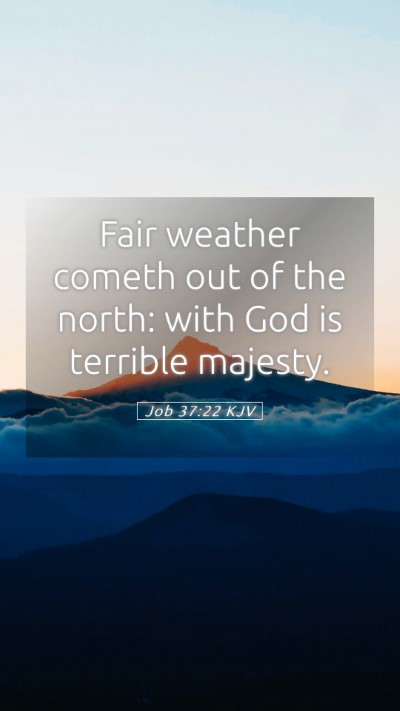Old Testament
Genesis Exodus Leviticus Numbers Deuteronomy Joshua Judges Ruth 1 Samuel 2 Samuel 1 Kings 2 Kings 1 Chronicles 2 Chronicles Ezra Nehemiah Esther Job Psalms Proverbs Ecclesiastes Song of Solomon Isaiah Jeremiah Lamentations Ezekiel Daniel Hosea Joel Amos Obadiah Jonah Micah Nahum Habakkuk Zephaniah Haggai Zechariah MalachiJob 37:22 Meaning
What is the meaning of Job 37:22?
Fair weather cometh out of the north: with God is terrible majesty.
Job 37:22 Bible Verse Meaning
Understanding Job 37:22
Job 37:22 states: "Fair weather cometh out of the north: with God is terrible majesty." This verse carries profound meanings and can be explored through various insights provided by prominent public domain commentaries.
Bible Verse Meanings
Job 37:22 reveals the awe and power of God in relation to nature. The imagery of "fair weather" coming from the north symbolizes clarity and beauty, contrasted with the majesty of God which is 'terrible' or awe-inspiring. This verse invites readers to contemplate the divine control over the natural world, suggesting that while nature can be beautiful, it is ultimately subordinate to the Creator.
-
Commentary by Matthew Henry:
Matthew Henry emphasizes the significance of the north wind, which is often associated with clear skies and fair weather, metaphorically pointing to the greatness of God's presence. He notes that true beauty in nature reflects God's glory and power, stressing that God's majesty commands reverence and fear.
-
Insights from Albert Barnes:
Albert Barnes highlights the themes of God's omnipotence and sovereignty. He explains that the weather serves as a reminder of God's presence. The expression of "terrible majesty" reflects the awe that humans should feel in God’s presence, displaying both His kindness and His ability to impose justice.
-
Analysis by Adam Clarke:
Adam Clarke interprets this verse as a stark reminder of God's uncontrollable power. Clarke delves into the meteorological aspects, explaining that the north wind, often cold and fierce, signifies not only God’s creative powers but also His ability to bring about change and renewal in creation.
Scripture Analysis
This verse serves as an invitation to study the natural phenomena as manifestations of God's character and intentions. Understanding Job 37:22 within the broader context of the Book of Job enhances appreciation for the themes of suffering, divine justice, and the nature of God’s authority. It ties together the emotional turmoil of Job with the transcendent majesty of God that is revealed through nature.
Biblical Exegesis
The exegetical approach reveals intricate layers of meaning embedded within the text. Job’s discourse about God's power over the elements mirrors the larger existential questions raised throughout the book—the struggle to understand suffering amidst divine omnipotence. This verse highlights the dichotomy of human experience and divine majesty.
Bible Study Insights
In studying Job 37:22, readers are encouraged to reflect on their understanding of divine majesty in relation to personal experiences, particularly hardships. The exploration of this verse in Bible study groups can lead to deep discussions on how creation reflects the Creator’s character and the profound respect and fear that this evokes in humanity.
Application of the Verse
Applying the wisdom of Job 37:22 in daily life includes recognizing the beauty in nature as a manifestation of God's glory. It serves as a reminder to approach God with reverence and to trust in His overarching plan during times of suffering. This can significantly aid in personal growth and spiritual maturity
Cross References
- Psalms 50:1: "The mighty God, even the Lord, hath spoken, and called the earth from the rising of the sun unto the going down thereof."
- Isaiah 40:26: "Lift up your eyes on high, and behold who hath created these things, that bringeth out their host by number: he calleth them all by names."
- Romans 1:20: "For the invisible things of him from the creation of the world are clearly seen, being understood by the things that are made."
Conclusion
Job 37:22 encapsulates the essence of God’s majestic nature in the context of His creation. Through various commentaries and interpretations, it becomes evident that this verse not only invites us to admire the beauty of nature but also to recognize our place before a God whose majesty is both beautiful and fearful. Engaging with this verse in Bible study settings promotes a greater understanding of Scripture and deepens one's spiritual journey.


